Support strong Canadian climate journalism for 2025
Climate change is increasing the risk of armed conflict as the environment and economies are destabilized. Now, NATO says its militaries will also have an important role in their home countries, countering disinformation and responding to extreme weather emergencies.
Last year was a year of fire with 93,000 hectares burning in northeastern Greece, Hawaii fires killing 99 people, and at least 2,200 military personnel deployed to fight wildfires in Canada as 235,000 people were evacuated.
In a report published this month analyzing the effect of climate change on NATO’s strategic, operational and tactical planning, the world’s most powerful military alliance described profound changes on the horizon as the climate crisis deepens. According to the alliance, rising temperatures and corresponding changes to the environment will impact its capabilities on land, in the sea, in the sky, in cyberspace and outer space.
NATO outlines the physical threats from climate change, like extreme heat buckling roads and rails complicating its ability to conduct ground warfare, rising sea levels threatening satellite launch stations, and changing ocean salinity affecting the sonar capabilities used by submarines.
“Although the relationship between climate change and armed conflict is complex, a growing body of authoritative research and analysis notes that climate change has the potential to contribute to higher levels of conflict, instability, and violence,” the report reads. “Indirect impacts of climate change, such as climate-induced instability, large-scale population movements, and disruptions of global supply chains, are likely to alter the strategic environment in the medium to long term.
“In addition, ‘tipping point’ climate events – such as abrupt changes in key oceanic currents, or the collapse of agriculture systems – could fuel a rapid escalation of instability and displacement in regions already experiencing climate stress.”
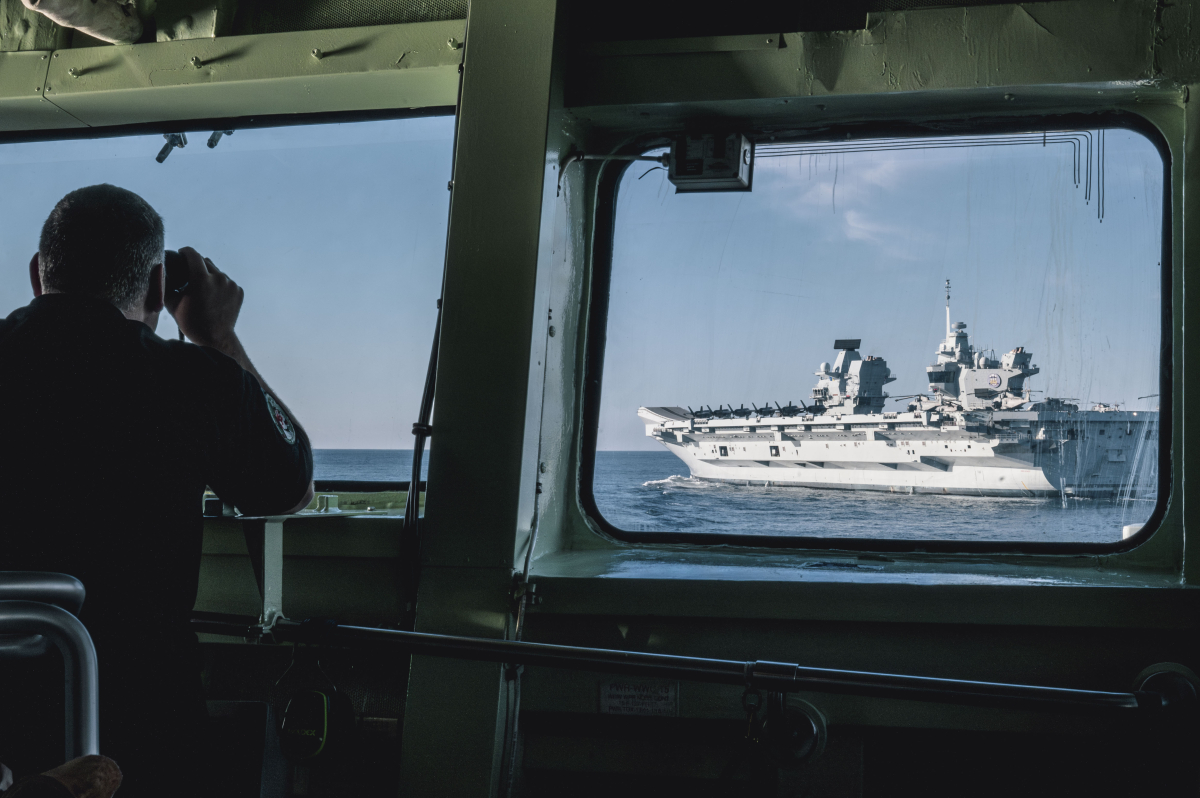
At the NATO summit hosted in Washington D.C. in mid-July, the alliance published its “Washington Summit Declaration,” outlining its priorities. The statement focuses on Russia’s invasion of Ukraine, accuses China of enabling Russia’s invasion and attempting to “divide” NATO, acknowledges climate change is a threat, and calls on countries to exceed the 2 per cent of GDP target to be spent on military set a decade ago.
At the summit, Prime Minister Justin Trudeau announced Canada would reach the 2 per cent target by 2032. For Canada, which hosts NATO’s climate change research office in Montreal, the rapidly warming Arctic is a top concern.
In particular, the NATO climate change and security report notes the North Warning System (an early warning radar system stretching from Alaska to the Atlantic coast in Labrador) is vulnerable to the loss of sea ice, permafrost thaw resulting in ground instability, and increased wildlife risk as the Arctic warms.
Domestic climate disaster response
NATO warns that increasing extreme weather events can “overwhelm” national resources, necessitating an international response. In 2023, there were at least 29 international military deployments to 14 countries, according to the Council on Strategic Relations military responses to climate hazards tracker. Since 2022, the tracker has recorded 317 deployments to 82 countries.
Former General Wayne Eyre told a House of Commons defence committee in 2022, the Canadian military is increasingly called on to respond to natural disasters, but the Canadian Forces should only be the last resort.
Similarly, in an interview with the CBC last year, the Canadian military’s top operations commander, Vice-Admiral Bob Auchterlonie, said the military spent 141 days responding to wildfires and helping with evacuations. While the evacuation of Yellowknife was an example of the military playing a crucial and relevant role, he said the military was being called on too much and was used as a stand-in when other agencies could help.
The argument for militaries responding to disasters like floods and wildfires is that troops are stationed across the country and can be deployed relatively quickly to help.
But “militaries are notoriously expensive for doing anything,” and troops aren’t specifically trained for emergency response, said Andrew Heffernan, a political science professor at the University of Ottawa, specializing in climate change, mis/disinformation and international relations, in an interview with Canada’s National Observer
“I totally agree with the fact that NATO and all militaries around the world probably need to be better prepared to respond to these kinds of things… but I also don't think they're the best response,” he said, suggesting “purpose built” organizations could be set up and funded accordingly.
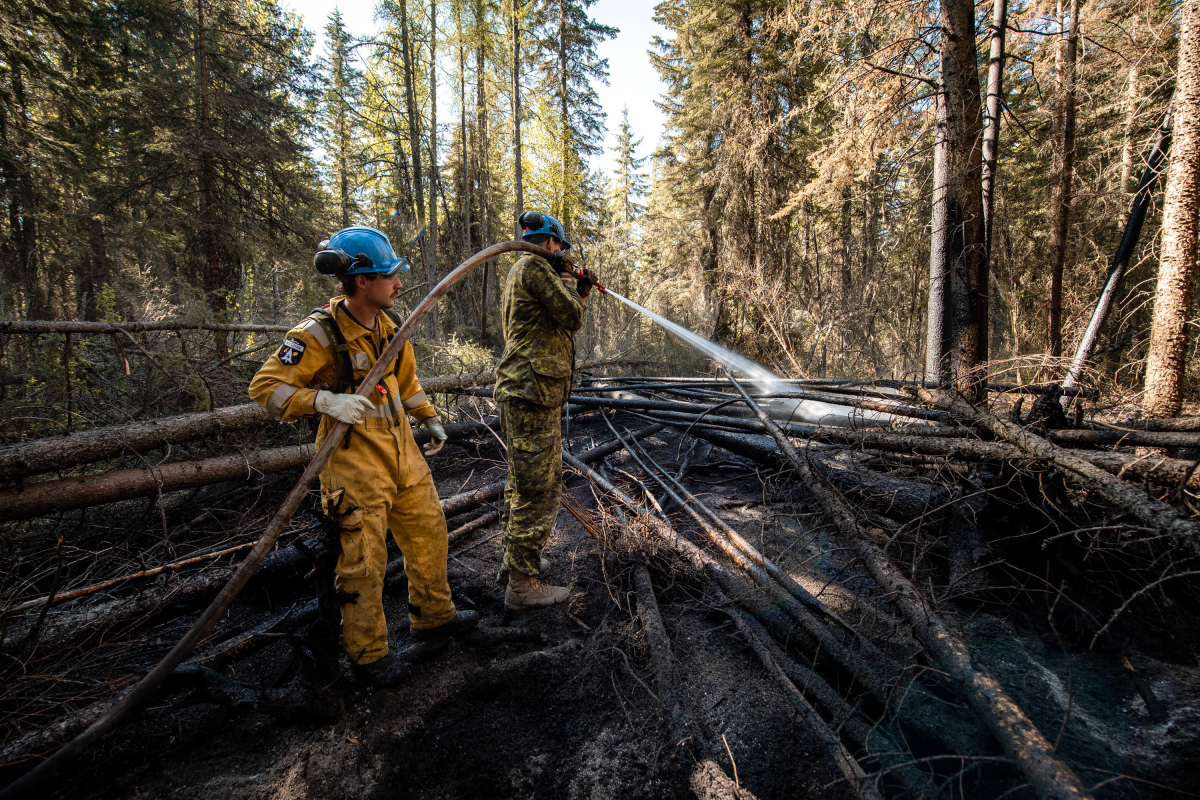
Dimitri Lascaris, a Montreal-based lawyer and prominent NATO critic who placed second in a bid to lead the Green Party of Canada in 2020, said the military shouldn’t be used for natural disasters.
“The reason why, I think, we keep assigning the military to perform disaster relief is: A) it's really good PR for the military; and B) it's another excuse to give more money to the military,” he said.
For Lascaris, increasing military spending to help deal with the climate crisis is precisely the wrong thing to do for a variety of reasons. First is the high level of greenhouse gas emissions associated with the military, as well as contaminants and pollutants resulting from warfare. But beyond warfare, more military spending means less money for reducing emissions and adapting to warming already locked in, he said.
“In order for us to deal responsibly with the climate crisis, we have to achieve an unprecedented level of international cooperation,” he added. “Militarism is an obstacle to that level of cooperation.”
In other words, as NATO increasingly puts Russia and China in its crosshairs, as it did in its recent “Washington Summit Declaration,” cooperation between Western countries and Russia and China on climate change becomes more difficult because of increased geopolitical tension.
Who pushes disinformation anyway?
NATO says Russia and China have pushed disinformation and outright conspiracy theories in the West to undermine climate action and sow division.
The alliance says it has observed increased Russian-linked disinformation in Europe relating to renewable energy investments, Russian-linked social media accounts vilifying climate activists and exploiting the devastating Hawaii wildfires with a social media campaign and slogan, “Hawaii, not Ukraine.” NATO accuses China of spreading a similar conspiracy theory, suggesting the Hawaii fires were “a deliberate result of a secret ‘weather weapon’ testing by American intelligence agencies.”
Heffernan says it’s difficult to determine which disinformation campaign is linked to who. It’s easy for NATO to say “actors like Russia and China” are behind the campaigns, “but it's also far too simplistic to suggest Russia is doing all of this, or China is doing all of this,” he said. “There is a lot of grey area, with a lot of different actors doing this for a lot of different purposes.”
For instance, researchers from Carleton University, McGill University’s Centre for Media, Technology and Democracy, and Climate Action Against Disinformation found right wing influencers spread disinformation as last year’s wildfires blanketed much of Canada in smoke. The disinformation pushed conspiracy theories that the wildfires were a result of “eco-terrorists, left extremists, and governments” to advance a climate agenda — a conspiracy theory Alberta Premier Danielle Smith fed into.
Far-right Canadian media outlet The Rebel similarly advanced conspiracy theories relating to the Hawaii wildfires over a series of reports called “The Truth About Maui,” which cast doubt on climate science, and platformed Calgary based climate change denial organization Friends of Science, which has received funding from the oil and gas industry.
As previously reported by Canada’s National Observer, disinformation has been spread by pro-natural gas groups and Conservative Party of Canada Leader Pierre Poilievre to mislead Canadians in an attempt to foment outrage against the federal Liberal Party.
Given disinformation can come from domestic sources, including the fossil fuel industry and supportive politicians, Lascaris said it’s good to be skeptical of NATO’s claims that Russian and Chinese disinformation is sowing division in Western countries.
“The idea that Russian disinformation is more influential in the West than American disinformation is laughable,” he said. “How many people in Canada, the United States or any other Western country get most of their news or information… from Russian sources? How many of them get it from the United States primarily? Or from other Western based corporate media?”

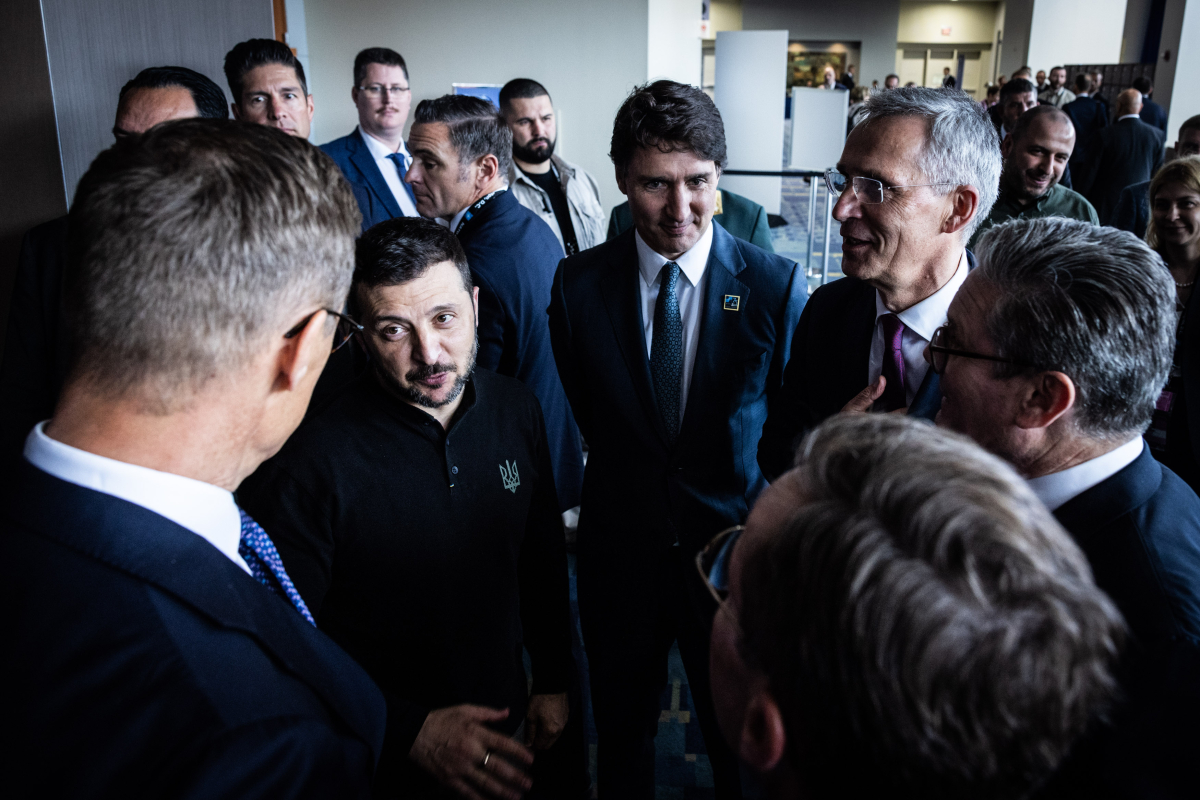

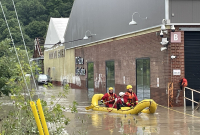
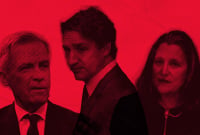

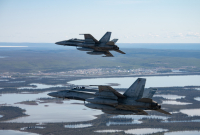
Comments
There is a direct link between Kremlin narratives and what is regurgitated by right wing organizations in the West. In fact, in too many cases it's almost word for word.
Underming democracy is a key goal for authoritarian regimes, and they have been partially successful by sowing chaos from within mainly through propaganda and fomenting division. Russia is especially adept at it; Putin et al have a deep interest in pushing fossil fuels and part of their effort is to inject doubt and conspiracies into the efforts to fight climate change.
China is different. It wants to dominate world markets and has bought or stolen commercial and scientific data from Western companies and ran with it at full steam. Today it is tops in producing high quality renewables, such as solar panels, and have lowered prices dramatically. We in the West are largely accepting this dominance because the products are a bargain, and they offer the opportunity to release the shackles imposed by oil companies and petro states on their respective economies, many of whom collude with each other with great effect.
NATO evolved from the Cold War, and as a counterw
...counterweight to Russian aggression. As long as there is a Putin who is stupid enough to follow Stalin and invade its neighbours with vast armies based on century-old war strategy, there will need to be a NATO. But seeing Russia's efforts to undermine climate policy so it can export its oil means that NATO should expand its counterespionage and digital countermeasures. Obviously, NATO recently expanded to provide a stronger defense against Putin's military idiocy to break down the doors of Poland, the Baltics, Moldova, Hungary and pther neighbours.
Both Russia and China are interested in Arctic resources, including Canad
...Canada's. Both are present under the ice, as are the Americans. What exactly is Canada's Arctic policies regarding defense of the archipelago and against the exploitive desires of other nations for Canadian minerals? What are we willing to do about international shipping eyeballing the Northwest Passage as an alternatve to the Panama Canal?
Saying No to a be
...beefed up naval and Coast Guard presence with additional funding is not a solution that will protect the pristine Arctic evironment or bolder nations from sailing through the passages without Canadian oversight.
In fact it's beyond naive to believe negligence will somehow prevent other nations from putting their hands on Canada's Arctic resources without some kind of legal and physical enforcement of rules thar have yet to be composed.
In general, I don't buy the idea that Russian disinformation has a lot to do with American (and Canadian) right wing alternative-fact culture. Not that I don't think the Russians are doing disinformation, just that when the money gets followed, the amounts of cash funneled into this stuff from private, mainly American, actors always seems to be orders of magnitude bigger than anything the Russians manage. This is just another case--yes, the Russians are a big oil-exporting country, they want to pretend climate change doesn't exist, I'm sure they're putting out some disinformation on climate change. But if someone wants to tell me Russia is the "real" source of this kind of crap, and not say the surviving Koch brother or ExxonMobil or Shell or (on and on), I'm going to be laughing pretty hard. The real money and the top experts on lying . . . um, public relations . . . in this field are Western, and particularly American.
Meanwhile, NATO allegations that China is spreading disinformation specifically on climate change are risible. China is the main planetary driving force behind the energy transition. They don't have oil of their own so they'd love to replace those imports with energy production at home. They make most of the world's solar panels and batteries and a whole stack of the wind turbines and increasingly most of the electric cars. They're aggressively building alternative energy in China. They have NO reason to downplay climate change--if people don't believe in climate change, they won't buy all China's nifty climate-change-combatting products. It's a totally stupid claim, and it's hard not to feel that the people making it know that perfectly well and are just lying.
(China may spread disinformation on other subjects, although for reasons I don't understand they don't seem to be very good at that. Just not about climate change)
You'll have no disagreement with me on China's efforts to build their way out of carbon dependency.
Xi Jinping is smarter than Putin by light years. I wouldn't be surprised to see China reclaim it's former eastern Siberian territory lost to Russia in another one of Russia's historic stupid empire expansion adventures once the Russian economy and military has been worn down enough by their current war in a year or two.
Xi has Putin by the curlies on Siberian oil and gas, demanding a price equivalent to Russia's internal wholesale price, effectively eliminating profit margins, and also on the financing of the pipelines. China is also laughing because it is decarbonizing so fast that it may not need Russian fossil fuels by the time the pipes are built -- IF they are built.
Concurrently, Western LNG and coal heading to Chinese markets will face the same dilemma demand loss soon enough. According to estimates by Ember, the EU's gas consumption will be cut by 50% by 2030, perhaps earlier, due to the rapid rise of solar, wind and batteries.
The Koch (and other)-funded narratives, which helped start up the Tea Party, which morphed into MAGA, are eerily similar to the top Russian TV propagandists on oil and empire building. The analysis is there if you want to find it. The propaganda has shifted to the invasion of Ukraine, mainly with the call for "peace" talks by the Kremlin's authoritarian-in-chief and many other authoritarian wannabes like Trump, MAGA loudmouths in the US Congress, Hungary's Orban and other conservative Russian sympathizers in the EU. Basically, "give us the occupied territory taken by mass murder and destruction, and help us defeat an emerging democracy and we'll stop shooting." I rank that higher than Russia's nuclear blackmail and threats, which have occurred hundreds of times since the war began. Note how the call for peace talks just happens to dovetail with Russia's terrible losses, proportionally more than Ukraine's, the very effective damage to Western-built Russian oil infrastructure by cheap drones with no ability to attain spare Western parts, and the spectre of Russia's economic collapse if they don't find a way to cajole the West into lifting sanctions and helping Ukraine defend itself.
I think it's naive to rack this war up to only American military adventurism and warmongering weapons building by Raytheon and its bought politicians in Congress. Ask Finland, Sweden, the Baltic nations and Poland what they feel about that compared to their much greater worry right next door.
And lest we forget the direct, proven link to Russian hackers influencing the 2016 US election, which was technically lost by Trump by three million votes but "won" by the archaic electoral college.
"...and stop helping Ukraine defend itself."
If you think the Russians are taking losses "proportionally more than Ukraine's", or for that matter that their economy is threatened with collapse, you are dreaming. Personally, I'm not a big fan of either NATO or Russia, so I don't consider Russia my enemy. But if you do consider Russia the enemy, it is foolish to underestimate them.
So, first, Russia's economy is, according to all the usual international sources, World Bank or whatever, doing fine. It's growing at a normal sort of rate, and the growth is probably more healthy than their pre-war economy's growth, because they're doing a lot of (forced) import substitution. There is no spectre of collapse.
And second, I watch daily blow-by-blow accounts of what's happening on the front in that war. It is clear that the Ukrainians are losing far more people than the Russians. The supposed human wave attacks or whatever the hell never existed--I see video of Russian attacks every day, they generally consist of a couple of tanks and a few APCs; the tanks try to screen the APCs while the APCs rush to a tree-line or something and drop off the soldiers. Sometimes it works, sometimes it doesn't. These days they sometimes use swarms of motorcycles instead--too small and fast to drone effectively. But the real key to casualty levels is all about standoff weaponry--artillery, drones, missiles, bombs from planes. Every day I see lots of places noted all along the front where the Russians have bombarded the Ukrainians with artillery, big bombs and missiles, killing lots of defenders. I do not see the reverse; Ukraine never had much air power and what they had is mostly gone; they never had a lot of missiles; and their use of artillery has gradually reduced over time to very little, because the Russians hunt their artillery every time they use it. At this point even most of the HIMARS have been blown up. Ukrainian air defenses have clearly been degraded over time, allowing the Russians to do more and more aerial bombardment. The Ukrainians do still have quite a lot of drones, and this has been important and effective for them, but the Russians have even more. And I have the feeling that even the Ukrainian level of drone use has declined a bit over the last while. In any case, while drones are very good at taking out armoured vehicles and supply trucks, they are not that great at taking out large numbers of troops. If you have a squad sitting in a fairly solid building, a drone is not going to do anything--but a 500 kg bomb will flatten the building and everyone in it. So basically, if you look at the front day to day it is clear that the Russians are doing things that kill lots of enemy troops, and the Ukrainians mostly are not able to, so there is no possible way attrition is not favouring the Russians to a pretty lopsided degree. This also helps the Russians not lose too many people in their attacks--they do a lot of artillery preparation before they attack, so there will be few defenders left.
Like it or not, that's how it is. There is talk of negotiation reaching the news these days because a lot of the West is starting to think they'd better negotiate, because they're realizing that the longer they wait, the more territory Russia will take.
I am also paying attention and consume daily reports. I don't know why you would discount sources like Oryx which reports only DOCUMENTED losses on both sides with geolocated photo evidence. Or respected economists and independent military analysts.
Perhaps your economic analysis will uncover Russia's labour and productivity levels and estimate it forward as it approaches three years of involvement in the largest war it's had in 80 years, one that it and it alone started. Or are you going to argue that it's not Russia's fault it was "forced" into mass murder of civilians, territorial "liberation" and the levelling of cities because of NATO or American imperialism or Nazi hooligans or some other contorted post invasion justfication?
And as for "gaining territory" I suppose an average of 30 km across a 1,000 km front in 2.5 years could be called "progress" of some kind, but it barely adds to the 15% of Ukrainian territory it first accupied in 2014, eight years before Putin's main invasion.
And please do not discount the thousands of km2 Ukraine liberated from the Russian army in Kharkiv and Kherson oblasts.
NATO has voluntarily expanded in reaction to Rusdia's aggression toward its neighbours. Europe is steadily weaning itself off Russian fossil fuels, which is the Number One component of Russua's economy. Irreparable damage has been wrought on Russian oil refining capacity (not just storage) which was built by Western companies and which is permanently offline because Western companies are not supplying spare parts any more. Ditto Russia's airlines. Russia's labour force has been severely eroded by hundreds of thousands youth fleeing in 2022 before the borders were closed, the deaths of 1/2 million conscripts from Russia's eastern ethnic communities, prisoners and a smattering of ill equiped foreign fighters lured by a steady salary. Putin's last resort is to conscript the remaining Russian youth, a step he knows will lead to great disatisfaction with his regime. Meanwhile, Russia is scraping the bottom of the barrel with replacement equipment, now down to WWII era tanks and imported Chinese golf carts and Iranian drones. It has abandoned Sevastopol, the main naval base in Crimea and noved what's left of their Black Sea fleet east of the Kerch Strait. Russian air defense in Crimea has been devastated. Ukraine's smart strategy using cheap sea and air drones along with very judicial use of Western missiles has been very effective. And Ukraine doesn't even have a Black Sea fleet.
There is no better way to destroy a country's economy than to conduct a continuous war over thousands of km for years, and to try to rely on mainly one export to maintain it.
If Russia did not invade and occupy Ukraine then we wouldn't be having this conversation.
Please note that I did not make any moral points. You appear to think that Russia being unjustified in starting the war, or simply being on the opposite side from you, must mean that it is losing and/or incompetent. History suggests this is a foolish position. And you appear to be drawing your factual ideas from people with the same perspective, so you end up with warped "facts". I'm sorry, but most of the factual stuff you're saying is just nonsense.
I will make one political point, though. It certainly was Putin's decision and his alone to invade Ukraine, and it was and is clearly an invasion and his cute language about "special military operations" does not disguise that, and there is ultimately no ethical justification for invasion. It is also true, however, that NATO's politics in the years following the cold war were very aggressive and recklessly invited such a result. NATO expanded "in response to Russian aggression"? Don't make me laugh. NATO started expanding shortly after the end of the Cold War, when Russia was still a basket case with neither the will nor the capacity for aggression. It did so despite having given assurances that it would not. Many NATO policies for 30 years on end were dedicated to bringing NATO's borders right up to Russia, while completely ignoring every diplomatic overture from Russia trying to get an agreement not to do this. Many senior US foreign policy players made it clear that their objective was to break Russia into smaller countries so it could never become powerful again. Meanwhile, top scholars of international political economy as well as top diplomats pointed out repeatedly as far back as 2000 that trying to bring Ukraine into NATO was considered by the whole Russian elite, not just Putin, as the "reddest of red lines" which they would take drastic action to stop. Justified action? No, doubtless not. But predictable action, certainly. And there was never any particular justification for the idea of getting Ukraine to join the North Atlantic Treaty Organization . . . aside from all the reasons that Russia was paranoid about.
So sure, no aggressive war is justified (including all the US ones). But that doesn't mean nobody else ever bears any blame. And we know the US would have done exactly the same thing in their position. If China had spent billions of dollars to trigger a coup in Mexico that installed a pro-China government which started purging anyone who spoke English and announced plans to join the Shanghai Co-operation Organization, I think there is exactly zero doubt that the US would invade. Likely they wouldn't have stopped there but would have started a war with China as well. And . . . YOU WOULD CLAIM IT WAS COMPLETELY JUSTIFIED. If your ethics change depending who's being judged, they are fake.